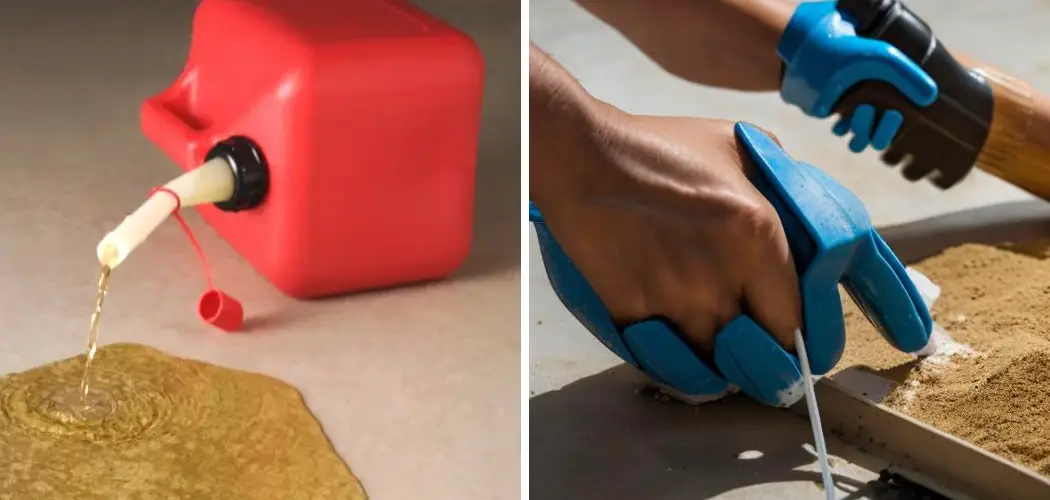Spilled gas in your garage can leave behind a strong and persistent odor that is not only unpleasant but also potentially hazardous. Whether it’s from a leaky gas can or a minor spill while refueling equipment, promptly addressing the smell promptly is important for maintaining safety and comfort.
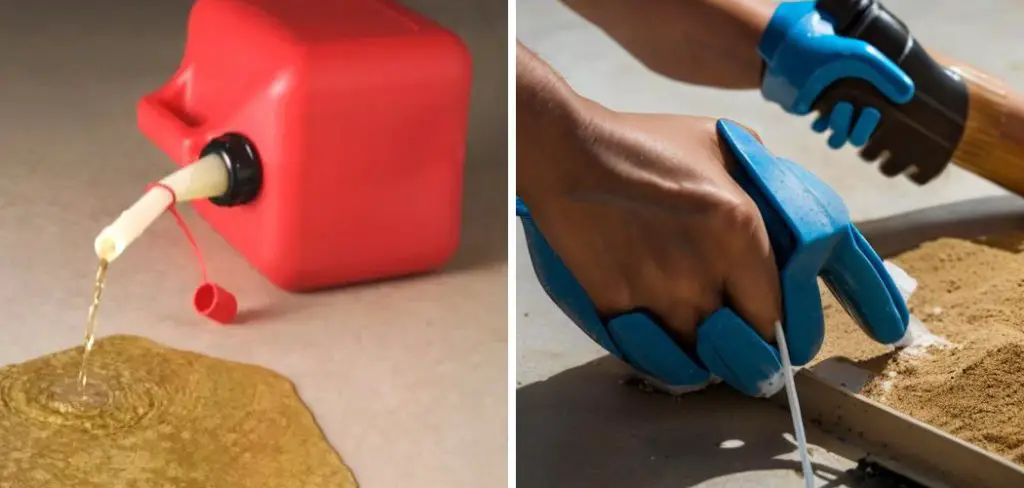
This guide on how to get spilled gas smell out of garage will walk you through effective methods to eliminate the gas smell and keep your garage fresh and odor-free.
Why is the Smell of Spilled Gas in Your Garage a Cause for Concern?
The smell of spilled gas in your garage should not be taken lightly. Gasoline contains highly flammable and toxic chemicals, which can pose a serious health risk if inhaled or ingested. These chemicals include benzene, toluene, and xylene, which are known to cause irritation to the respiratory system and other potential health issues with prolonged exposure.
Furthermore, gasoline vapors can easily ignite if exposed to an open flame or spark, making it important to remove any spilled gas as soon as possible. The odor itself can also be overwhelming and unpleasant, making it difficult to spend time in your garage.
Needed Materials
To safely handle and clean up gasoline spills, you will need the following materials:
- Absorbent Material (Such as Kitty Litter or Sawdust)
- Sealable Container
- Plastic Bags or Trash Cans
- Soap or Detergent
- Water
- Broom or Vacuum Cleaner With HEPA Filter
It is important to have all of these materials on hand before attempting to clean up a gasoline spill. Make sure to wear protective gear at all times and follow the steps carefully.
7 Steps on How to Get Spilled Gas Smell Out of Garage
Step 1: Put on Your Protective Gear
Before starting the cleanup process, ensure you are wearing the appropriate protective gear. This includes gloves, safety goggles, and a mask to prevent inhalation of fumes. Gasoline can emit harmful vapors and may irritate your skin, so prioritizing your safety is crucial.
Make sure all protective equipment fits properly and provides adequate coverage before moving on to the next step.
Step 2: Ventilate the Area
Next, you will want to open all doors and windows in the garage to allow for proper ventilation. This will help reduce the concentration of fumes in the air and prevent them from lingering in your garage. Using a fan can also help circulate fresh air in the space.
It is important to continue wearing your protective gear while ventilating the area, as fumes can still be present and harmful. If possible, it is recommended to also use a respirator mask for added protection.
Step 3: Absorb Excess Gasoline
If there is any excess gasoline on the surface of your garage floor, use an absorbent material such as kitty litter or sawdust to soak it up. Place the material over the spill and let it sit for about 10-15 minutes before sweeping it up with a broom.
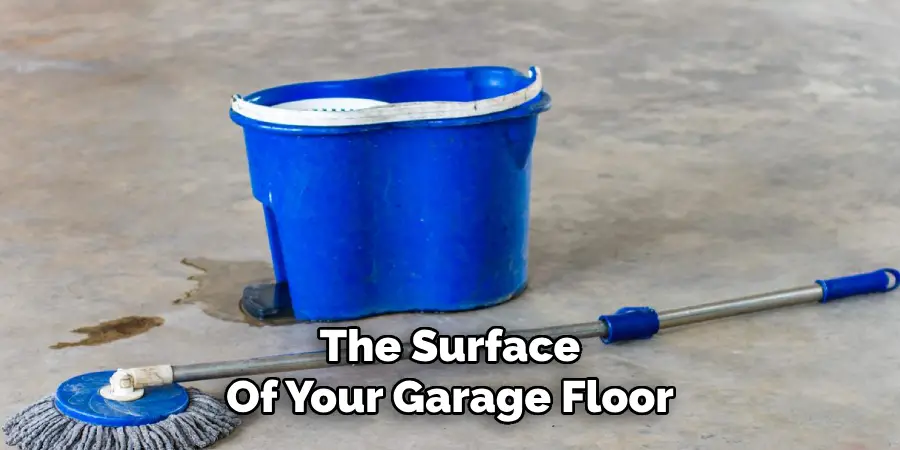
It is important to properly dispose of the absorbent material and any contaminated debris in a sealed container. Contact your local waste management facility for proper disposal guidelines.
Step 4: Clean and Disinfect
Once the gasoline has been absorbed, it’s time to clean and disinfect the affected area thoroughly. Use a mixture of hot water and liquid dish soap to scrub the floor, removing any remaining residue or stains.
After cleaning, use a disinfectant cleaner specifically designed for gasoline spills to sanitize the area. This will help eliminate any lingering fumes and potential hazards.
Step 5: Ventilate the Area
To further ensure your safety and that of others, it is crucial to ventilate the area where the gasoline spill occurred. Open all windows and doors to allow fresh air to circulate and help dissipate any remaining fumes.
If possible, fans or other ventilation systems can be used to increase airflow and eliminate fumes. It may also be helpful to leave the affected area undisturbed for a period of time, allowing the fumes to disperse naturally.
Step 6: Dispose of Contaminated Materials
Any materials that have come into direct contact with the spilled gasoline, such as rags or paper towels used for clean up, should be properly disposed of in a sealed container labeled as hazardous waste. Do not throw these items in regular trash bins, as they can pose a risk for ignition and release of fumes.
You may also need to dispose of any contaminated clothing or protective equipment worn during the clean-up process. These should be handled with caution and washed separately from other laundry.
Step 7: Seek Medical Attention
If you or anyone in the area has come into direct contact with the spilled gasoline, seek medical attention immediately. Inhaling large amounts of gasoline fumes can cause dizziness, nausea, and other health issues. It is important to seek professional medical help if any symptoms arise.
Following these steps on how to get spilled gas smell out of garage can help you safely and effectively clean up a gasoline spill. Remember to always prioritize safety and take precautions when handling hazardous materials. In case of any uncertainties, it is best to seek professional assistance for proper cleanup and disposal methods. Always be mindful of the environment and dispose of any contaminated materials properly.
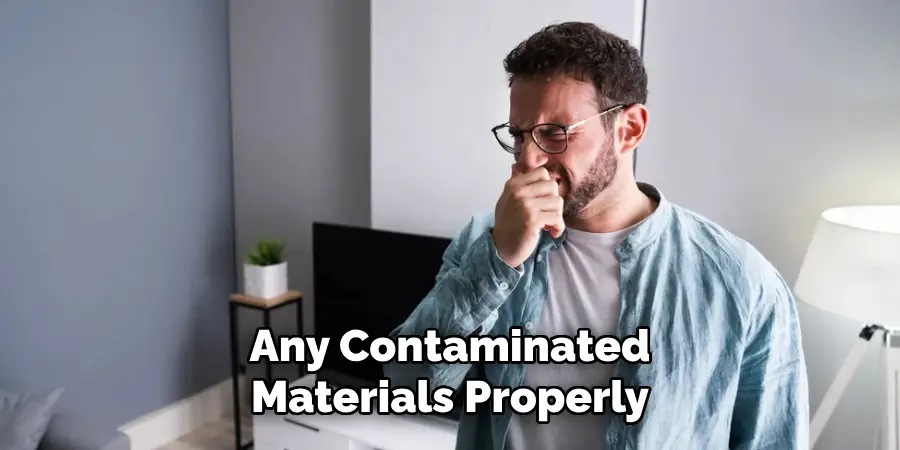
Additional Tips for Dealing with Gasoline Spills
- Keep a fire extinguisher nearby in case of accidental ignition.
- Avoid smoking or using open flames near the spill area.
- If possible, ventilate the affected area by opening windows and doors.
- Wear protective gear such as gloves, goggles, and a face mask, to avoid direct contact with the gasoline.
- Use absorbent materials such as kitty litter, sand, or sawdust to soak up the spill. Avoid using rags or towels as they can create static electricity and increase the risk of fire.
- Cover the spilled material with the absorbent material and let it sit for 15 minutes. Then, carefully sweep it into a dustpan and dispose of it properly according to local regulations.
- For larger spills or those on hard surfaces like concrete or asphalt, use a commercial spill kit specifically designed for gasoline spills.
- If the spill occurs on grass or soil, remove the contaminated layer of soil and dispose of it properly. Then, cover the area with a layer of activated charcoal or baking soda to absorb any remaining gasoline.
- Once the spill is cleaned up, ventilate the area by opening windows and turning on fans. This will help dissipate any lingering fumes.
- Be sure to wash your hands thoroughly after cleaning up a gasoline spill, and avoid smoking near the affected area until all fumes are gone.
- If the spill is on concrete, use a degreaser or kitty litter to absorb the gasoline and then scrub the area with hot soapy water.
- For spills in a car, avoid using paper towels as they can create static electricity and ignite fumes. Instead, use cloth rags or microfiber towels to clean up the spill.
Frequently Asked Questions
Q: Can Gasoline Spills Be Harmful to the Environment?
A: Yes, gasoline spills can have negative impacts on the environment. Gasoline is a toxic substance that can contaminate soil and water sources, harming plants and animals. It is important to clean up gasoline spills promptly and properly to minimize the environmental damage.
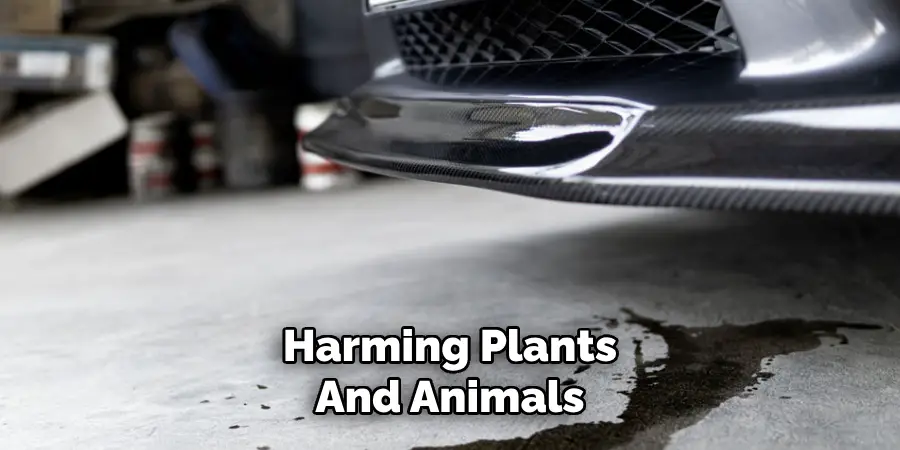
Q: What Should I Do If I Accidentally Spill Gasoline?
A: First, try to contain the spill by using absorbent materials such as kitty litter or sand. Then, carefully dispose of the materials following local regulations for hazardous waste. Ventilate the area by opening windows and turning on fans to dissipate any fumes. Finally, clean up the spill with soap and water and be sure to wash your hands thoroughly afterwards.
Q: Is It Safe to Use Household Cleaners To Clean Up Gasoline Spills?
A: No, it is not safe to use household cleaners to clean up gasoline spills. Household cleaners may contain chemicals that can react with the gasoline and cause dangerous fumes or fires. It is important to use absorbent materials, such as kitty litter or sand, to contain the spill and then properly dispose of them following local regulations for hazardous waste.
After containing the spill, ventilate the area by opening windows and using fans to dissipate any fumes. Only then should you use soap and water to clean up the spill and be sure to wash your hands thoroughly afterwards. So remember, never use household cleaners on gasoline spills!
Q: What Should You Do if There is a Gasoline Spill?
If there is a gasoline spill, it is important to take immediate action to contain and clean up the spill. This includes using absorbent materials such as kitty litter or sand to prevent the spread of the fuel and following proper disposal methods for hazardous waste.
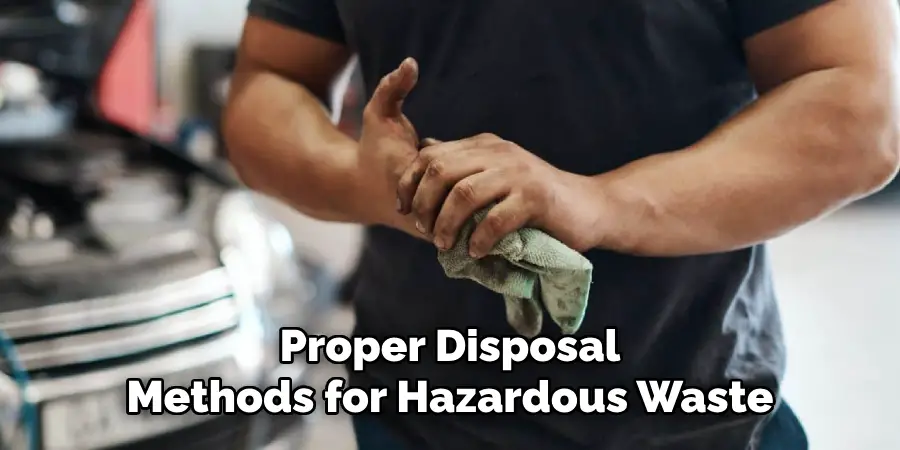
Conclusion
Promptly and Correctly Dealing with gasoline spills promptly and correctly is essential for protecting both your health and the environment.
By following the outlined steps on how to get spilled gas smell out of garage, you can ensure that the spill is managed safely and effectively, minimizing the risk of harm or further contamination. Remember to always handle gasoline with care and take preventive measures to avoid spills in the future.
I am Rick. I grew up helping my dad with his handyman service. I learned a lot from him about how to fix things, and also about how to work hard and take care of business. These days, I’m still into fixing things- only now, I’m doing it for a living.
I’m always looking for new ways to help people grow and develop. That’s why I have created this blog to share all my experience and knowledge so
that I can help people who are interested in DIY repair.

